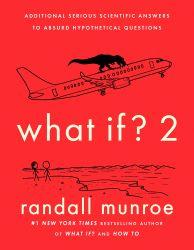
“What If? 2” is a must-have for both information and entertainment! Randall Munroe takes the wildest want-to-know questions from curious minds and presents them with serious — yet hilarious — scientific answers. From filling the solar system with soup to creating raging candy storms, Munroe comically lays out the effects of each silly scenario. Curious minds will devour this book full of the perfect balance of fact and fiction. “What If? 2” finds a whole new purpose for the world of science!
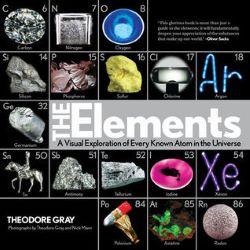
I truly have nothing bad to say about Theodore Gray’s book, The Elements. It is is both informational and entertaining, making it a super engaging read. It is chock full of facts about the periodic table and every element in it. Gray combines firsthand experience, intelligence and insight with wit and dry humor to make his element explanation stand out in the world of nonfiction. Along with the superior style in which is written, The Elements also uses stunning photographs of the author’s actual collection of items representing the periodic table’s vast content. In short, The Elements is an absolutely astonishing piece of work. Putting it down is impossible!
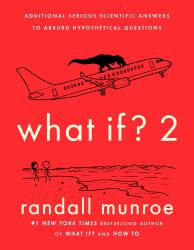
As a fan of XKCD, I've loved the What If? spinoff series despite how irregularly Randall has updated it. Considering there have only been five new posts in the last five years, and they were all in the months leading up to the release of this book, I needed a good dose of What If? Partly because it had been so long since I had read any What If? posts, all the chapters in this book felt fresh and hilarious. Now that I read through it, I'm sad that I'll have to wait another eight years for a third book in the series.
Randall always has a down-to-earth style of describing incredibly complicated scientific concepts. This means What If? 2 is quite educational once you get past the ridiculous premises that readers have sent in. It's also nice how each chapter is easily readable in a few minutes so that I could just pick it up and get a good laugh before moving on to something else. After all, this book is straight-up funny. This should come as no surprise—again—given the absurd questions readers asked Randall.
It felt like this book had more new content than the previous book in the series. This might not be true, but it felt that way because I hadn't read any of the posts that made it into this book in several years. This was my main qualm with the first book: that it was just a printed-out part of the internet. In this sequel, there weren't just new questions answered but also quick little sections that covered easily answerable questions (as compared to its predecessor's highlights of disturbing questions with no answers). Overall, I found it to be a fun read and I'm counting the days until What If? 3 comes out.
Hilarious and scientifically accurate answers to oddball questions, I give What If? 2 4.5 stars out of 5.
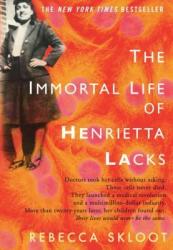
The Immortal Life of Henrietta Lacks, written by Rebecca Skloot, is a book detailing the life of Henrietta Lacks. Henrietta Lacks unknowingly donated her cells to one of the most important fields of research, cancer cures. Her tumor cells, also known as “HeLa”, are extraordinary in that they replicate fast enough to create a whole new human in under 48 hours. This book is fascinating in more than one way: it explores the history of her and her cells, and it explores some gray areas in rights to cells and parts of dead entities. Instead of focusing just on one topic and one family, it expands to include many that have had to deal with bio material rights. I personally found this an interesting but slightly disturbing read. I recommend reading this one to learn about the history of cell rights and their gray areas.
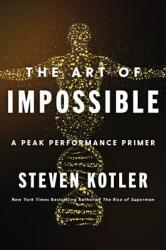
As the title would suggest, "The Art of Impossible", by Steven Kotler, prescribes a regime for achieving what he calls the "Infinite Game". In other words, achieving goals to continually improve, even in ways that might be considered impossible. Kotler depicts what top performers do on a daily, weekly, and yearly basis, and even adapts such habits into ways the average reader can understand and implement them. And while he does so in a systematic and understandable fashion, he also goes in-depth into the science behind each of the things he says. Although it sometimes gets deeply analytical, it never stops being intriguing. There are some parts that aren't completely family friendly, but the content remains solid.
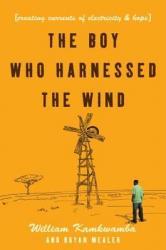
This book is one of the most inspirational stories I've ever read. The journey put forth, following William, is truly a gem that makes you think about what could've happened if something had been different. I loved reading it because I felt every details of William's journey to develop his windmill that put him on fame. His determination to prove that science is 'real' and can make a difference, especially during a time and in a culture that rejects it, shows his character and his want for a better life in his land. He perseveres through the struggles of drought and hunger, and overcomes the ridicule thrown from all sides to be able to rise up and rise above, and make his visions come true. A really inspirational story, that shows a hero's journey in a way not usually thought.
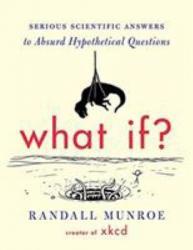
What If? by Randall Munroe is an amazing series of completely impossible and extremely strange scientific questions that are answered with complete scientific accuracy, and a bit of humor. Munroe takes questions people ask over the web and applies physics, chemistry, and other sciences to answer the questions. One of my favorite hypotheticals is what would happen if everybody pointed a laser pointer at the moon? Munroe approaches this by slowly increasing power, until the moon’s surface explodes, and it propels itself away from earth. The hilarious and entertaining questions can provide fun for anyone with an interest in science, and I would recommend it to anyone who’s thought of an impossible hypothetical question.
Reviewer Grade: 11
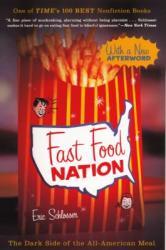
Fast Food Nation is a nonfiction book that is extremely informative about the fast food industry. The book starts with the history of fast food and then informs the audience of business deals, the horrors of fast food, and ways the fast food industry affects others. I picked this book because I wanted to know the truth to what happens in the fast food industry and all of the gross things that are done to the food. Fast Food Nation has several local and state references from Cheyenne Mountain to Greeley, Co. I really liked this book since it was outstandingly educational about every aspect of the fast food industry such as the meat industry, fast food employees, advertising, food poisoning and more; however, I would have liked it more if it went even more in-depth about all the ways the food is handled. Overall, I recommended this book if you want a good nonfiction read and if you want to be more educated about the five to ten dollar meal you buy frequently.
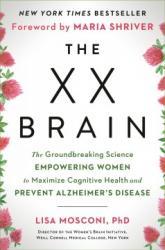
This is like a self help book. it was very intriguing and helpful. The steps it gives to help make your brain work weren't hard, and they work.
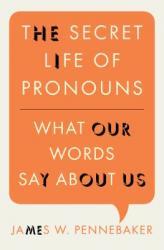
This book looks at what our pronoun usage in our language says about us. There is also an online website which uses the same tools Pennebaker uses in his studies, providing the reader with an interactive aspect as well. The concepts in the book about how different pronouns correlate with different social status, group dynamics, gender, and other factors provide an insight on an aspect of daily life most people never think about. It also includes charts and graphs to help convey information, although Pennebaker does not provide his raw data for portions of the book, only his conclusion. By the end of the book many points he makes feel repetitive, making the later chapters less interesting to read.
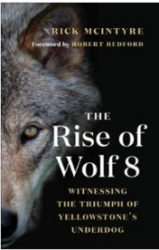
I knew almost nothing about wolves going into this book and I am obsessed with them now. Rick brings such life to the initial wolves that were introduced into Yellowstone. I found myself fascinated with the lives of these wolves and rooting for certain wolves to "win."
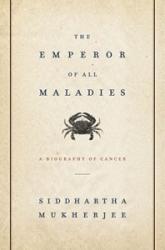
The Emperor of all Maladies is an informative and gripping history of cancer. Starting with the first recorded cases in ancient times and the remedies used by ancient doctors and progressing to the medical breakthroughs of chemotherapy and radiation, the book provides a wealth of information in a riveting tale. Dr. Siddhartha Mukherjee tells the stories of cancer’s most prominent adversaries like Dr. Sidney Farber as they work to develop life-saving treatments and procedures. The book is quite lengthy but kept me engaged throughout while teaching me about cancer history and treatment in a form that feels more like a novel than a textbook. If you want to learn more about one of the most prolific diseases in human history while viewing history through the lens of cancer researchers, The Emperor of all Maladies is perfect for you!
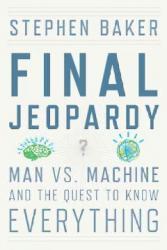
Final Jeopardy is a wonderful read. Final Jeopardy tells the story of Watson, the question-and-answering computer built by IBM to play Jeopardy. Stephen Baker describes the journey of Watson from an abstract idea, to an ignorant computer that took hours to answer a single question, to the great computing wonder that took on two of Jeopardy's greatest players, Ken Jennings and Brad Rutter. Final Jeopardy also gives insight into the great minds that developed Watson and their stressful years of programming leading up to the match. Final Jeopardy is a fantastic book and I highly recommend it for anyone who is a fan of Jeopardy, is fascinated by computers and their programming, or is interested in the future of technology.
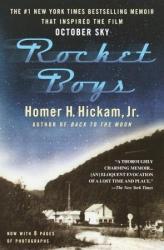
(Very immersive story) Rocket Boys is a book that shows the struggles of boys trying to break the tradition of a stereotypical miner town, dubbed Coalwood. I love how the descriptions bring light to the conditions of mining, and the towns surrounding the mine. It also brings light to the uproar that the Space Race caused, especially Sputnik. As the boys slowly figured out the basics of rocketry, it got more and more into the detail on how hard it was to create rockets when you live in a small town like that. As a footer, I just want to say that the boy’s determination to create those rockets was well shown.
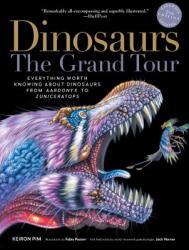
Dinosaurs: The Grand Tour is a remarkably well-encompassing resource, covering everything from polar dinosaurs (yes, you read that right) to a dinosaur three times taller than a giraffe. The information is presented in such a way that a layperson can follow along without feeling overwhelmed by scientific jargon. The author even included a pronunciation guide for the dinosaurs’ tongue-twisting names.
One of the main selling points of this book is the fact that it’s currently one of the most up-to-date resources on dinosaurs, with a publication date of 2019. Considering how quickly the field of paleontology continues to evolve, resources that were up-to-date ten years ago soon become... well… prehistoric. Notably, it’s also the second edition and has been expanded and updated since the original was published in 2016. Since I didn’t read the first edition, I can’t comment on how the two editions compare, but from what I can tell, you’ll be hard pressed to find a more cutting-edge resource on dinosaurs.
The illustrations are also nicely done, especially the color pieces that encompass two pages. It should be noted that most of the illustrations are not in color, so if you’re looking for a coffee table book, you might be disappointed. Still, the illustrations are beautiful as a whole and complement the text nicely.
Speaking of color, Pim explains how scientists have used fossilized pigment cells to determine both the colors of certain dinosaurs and the physical advantages these colors might have conferred. Considering this topic has been a source of mystery for many years, this section was particularly illuminating.
Finally, the quizzes peppered throughout the book are engaging and help you retain what you’ve learned. The author also includes an answer key at the back of the book, so if you don’t feel like hunting for the answer, you can always cheat.
Overall, I would recommend this resource to anyone interested in dinosaurs and paleontology in general.
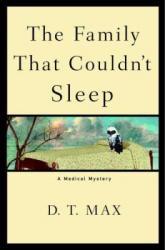
The Family that Couldn’t Sleep is a bit of a misnomer. Although the underlying thread revolves around a mysterious and terrifying disease called fatal insomnia, multiple chapters are devoted to other diseases, including bovine spongiform encephalopathy (better known as mad cow disease) and kuru (a fatal neurodegenerative disorder thought to be caused by cannibalism). All of these conditions are caused by mutations in prions, which are proteins of the central nervous system.
Most of the information on these diseases is fascinating, though some of the more technical information might require several re-reads if you’re a non-specialist (like me). Also, if you picked up this book wanting to learn exclusively about fatal insomnia, you might find yourself wanting to skip some of the other chapters.
Even so, this book provides a fascinating look at the tragic nature of fatal insomnia, especially the Italian family genetically predisposed to it. You’ll find yourself both sympathizing with them and horrified by the unrelenting nature of the disease.
I would recommend The Family that Couldn’t Sleep to anyone who is interested in prion diseases or epidemiology in general.
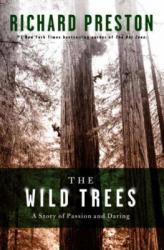
You might know Richard Preston from his nonfiction thriller The Hot Zone or Micro, a techno-thriller Michael Crichton started before his untimely death in 2008. Although the subject matter of The Wild Trees is very different from these works, it continues Preston’s trend of combining scientific detail with narrative finesse. Specifically, this book focuses on the California redwoods, but readers will learn as much about the redwoods themselves as they will about the men and women who study them. Steve Sillett, for instance, started climbing redwoods freehand without any equipment to break his fall. Considering some redwoods are nearly 400 feet tall, this feat is as awe-inspiring as it is terrifying.
This book also provides fascinating detail on redwood canopies, which house salamanders, copepods (a type of crustacean), and even other trees! Thanks to Preston’s meticulous research and eye-popping descriptions, readers will feel like they’re exploring the redwoods alongside him.
The Wild Trees is a must-read for anyone who loves the redwoods or nature in general.
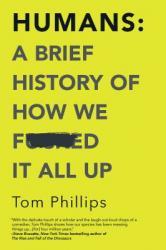
A thoroughly entertaining account of how far modern humans have come and how often they messed it up in groan-worthy ways despite best intentions. Journalist and humor writer Tom Phillips relies on sound scholarship to inform, entertain and maybe demoralize (in a funny way) the reader. Examples run the gamut from a Chinese emperor who stored gunpowder in his palace then hosted a lantern festival, the inadvertent forensics pioneer/lawyer defending an accused murderer who proved to the jury that the victim may have accidentally shot himself by accidentally shooting himself, the Austrian army that attacked itself one drunken night, and other equally spectacular blunders of modern times.
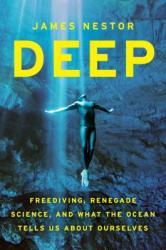
James Nestor’s book Deep: Freediving, Renegade Science, and What the Ocean Tells Us about Ourselves is both literally and figuratively the most breathtaking book I’ve ever read. It’s literally breathtaking because it’s about freediving, AKA diving sans scuba equipment, an activity as awe-inspiring as it is dangerous. (Side effects may include death, blood squirting out of your nose, mouth, and eyeballs, and paralysis.) Herbert Nitsch, the world’s self-proclaimed “deepest man” dove more than 800 feet on a single breath without using a scuba tank. And he lived to tell the tale.
Deep is also figuratively breathtaking because it reveals some of the most awe-inspiring facts about our ocean that you’ll ever read. Freediving is the only way to see sperm whales up close and personal. These behemoths' brains are shockingly similar to our own and allow them to communicate using a click-based language. Resulting studies have even shown that sperm whales have their own culture and distinct accents.
But freediving with sperm whales is, naturally, not without risks. Sperm whales’ clicks are so loud, their pulsations can literally kill us. One intrepid freediver found his hand temporarily paralyzed when a sperm whale greeted him with a click.
Deep is the rare sort of nonfiction book that reads like a thriller novel. Every page is chock-full of awe-inspiring revelations that will make you look at the sea with a sense of wonder typically reserved for children. Scientific journalism has never been this entertaining.
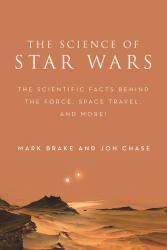
The Science of Star Wars by Mark Brake and John Chase is a fantastic read!
Explaining the science behind Star Wars the movie series through
understandable language and with humorous tone, the authors explore the
possibilities of realizing some of the fantasies of the galaxy far, far,
away. They also explain why some concepts in Star Wars will never be possible
in our own home. This book is appropriate for readers 16 and up. As a Star
Wars and science fan myself, I would definitely recommend this book.


